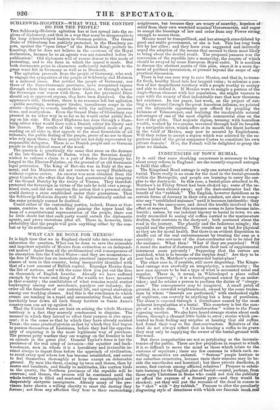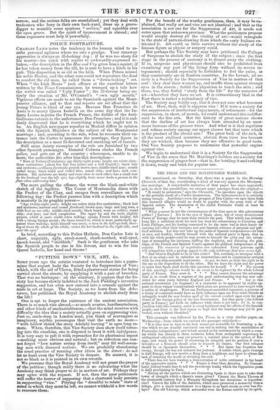INDECENCIES OF TOWN BURIAL.
IT is said that some shocking occurrence is necessary to bring about every reform in England: are the recently-exposed outrages to fulfil that office?
The Kingsland Road outrage is only one natural result of town burial. There really is no room for the dead in the burial-grounds within the Metropolis, and people are learning to carry the sur- plus to the dustyards. In this case, a burial-place attached to St. Matthew's in Friday Street had been choked up ; some of the re- mains had been cleared away; and the dust-contractor had the benefit of the "rubbish." The English, however fastidious as to certain forms of decency in their own conduct, are slow to recog- nize any "established nuisance" until it becomes intolerable: they are used to the annoyance, and dread the trouble involved in the effort at removal. But this nuisance seems to have become into-. lerable ; unless, by our indolent bigotry to burial in town we are really reconciled to seeing old coffins carried to the marine-store dealers, their contents to the dustyard ; both scattered about the road in the journey. The ghastly and the ludicrous mingle ; the squalid and the pestilential. The results are as bad for physical as they are for moral health. But there is an evident disposition to shuffle out of the real embarrassment by treating the case as a specialty: two servants of the dust-contractor are to be tried for the nuisance. What then? What if they are punished ? Will it mend the matter if dustmen perform their task of supplemental interment more privately ? Supposing that the carters are punished, what is to become of the surplus dead? Are they to be sent back to St. Matthew's overcrowded burial-place? The other case is, if possible, still more disgusting. The Kings- land outrage was avowedly an irregularity, a monstrosity : the new case appears to be but a type of what is accounted usual and regular. There is, it seems, in Whitechapel a place called "Sheen's Cemetery " ; it is a burial-ground owned by an under- taker ; and he retains a person to perform the duties of " clergy- man." The consequences may be imagined. A small patch of ground, in a crowded neighbourhood, owned by the same trades- man by whom "funerals are performed," with unchecked right of sepulture, can scarcely be anything but a heap of pestilence. The abuse is exposed through a disturbance caused by the most indecent irregularities at a burial. This cemetery is but the sam- ple of a whole class. "A Churchwarden" writes to the Times exposing another. We also have heard strange stories about such places, through a channel little liable to error ; stories which pre- vented us from feeling any surprise at hearing that old coffins had found their way to the dust-contractors. Relatives of the dead do not always reflect that in bearing a coffin to its grave. they may only be supplying the owner of the burial-ground with • fire-wood.
But these irregularities are not so perplexing as the inconsis-
tencies of the public. There are few prejudices in respect to which it is so difficult to move the mind as those which relate to the customs of sepulture ; there are few customs in which such re- volting anomalies are endured. " Serious " people hesitate to use suburban cemeteries, because there their remains may lie be- side the unorthodox and heretical ; but these private dustholes, it seems, find custom among afflicted relatives I Propose to substi- tute burning for the English plan of burial—copied, perhaps, from those early Christians in Rome who could not risk the publicity or afford the expense of a funeral pyre—and they would be shocked; yet they will put the remains of the dead in course to be " shot ' with " dry rubbish." Propose to alter the peculiarly disgusting style of dreariness with which our funerals raoctreel
sorrow, and the serious folks are scandalized ; yet they deal with tradesmen who bury in their own back-yard, dress up a grave- digger to mumble some spurious " service," and squabble over the open grave. But the spirit of improvement is abroad ; and these exposures must help it powerfully.



























 Previous page
Previous page